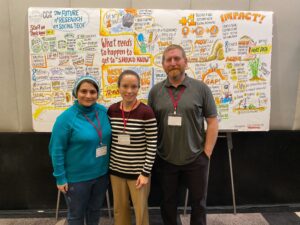
Motahhare Eslami (Carnegie Mellon University), Sarita Schoenebeck (University of Michigan), and Eric Gilbert (University of Michigan)
In November 2023, CCC hosted a workshop on “The Future of Research on Social Technologies” in Washington, DC. The event, also supported by the John S. and James L. Knight Foundation, addressed the past, present and future of social technologies research. The workshop brought together over 50 information and computer scientists, social scientists, communication and journalism scholars, and policy experts.
The workshop was organized by Motahhare Eslami (Carnegie Mellon University), Eric Gilbert (University of Michigan), and Sarita Schoenebeck (University of Michigan). The workshop organizers, along with nine workshop participants, wrote a fascinating workshop report based on workshop discussions that has been released today. The report explores what we do not know enough about in regards to social technologies, and what we should spend resources on in the coming years.
Below is a summary of the high-level opportunities (organized by theme) presented in the workshop report:
- Rethinking Social Platforms
- Researchers can help inform the governance of social platforms in ways that are social, technical, and legal.
- Researchers can significantly inform the trajectory of emerging decentralized social platforms, over the near- and long-term.
- Researchers can build methods—both quantitative and qualitative—to measure and assess the “health” of social platforms and online communities.
- Social Technologies and Democracy
- Researchers can significantly shape the design and study of social technologies to encourage democratic principles and protect against threats.
- The research community should invest in mutual support and stand up for threatened researchers, and advocate for strong protection for societally important, yet threatened, research at their home institutions.
- Social Technologies and AI
- Researchers should investigate and design mechanisms to use AI for prosocial ends in online communities.
- Researchers have an opportunity to build and test new designs for social platforms that recognize the presence of AI-generated content.
- Researchers can help safeguard certain social data from appropriation by AI systems, and AI systems from certain social data.
- Research Access and Practice
- Researchers should study both big platforms and small, niche communities with respect to data access opportunities.
- Researchers should explore opportunities to develop shared infrastructure and practices for data collection and sharing, and experimental work.
- Impact Beyond Academia
- The research community can increase the potential for impact by shifting incentive structures to recognize diverse kinds of work and contributions, particularly high-impact, large-scale, and/or community-centered work.
- Researchers can explore new models of research that move beyond individual researchers towards collective efforts.
- Researchers have an opportunity to impact policy related to social technologies.
The workshop report authors provide many concrete opportunities in each of these areas, and elaborates on the potential researchers have to make the social technologies ecosystem more useful, secure, and equitable.
Read the full Future of Research on Social Technologies CCC Workshop report here.









